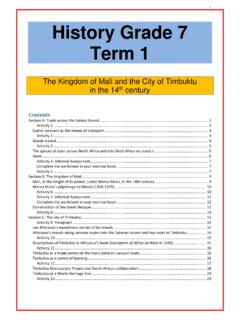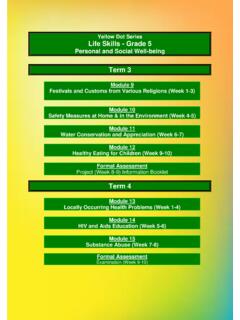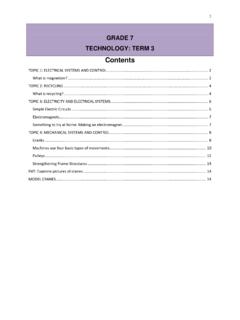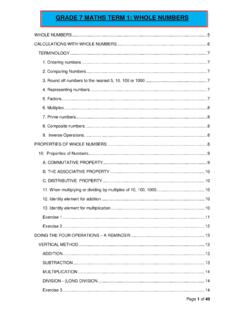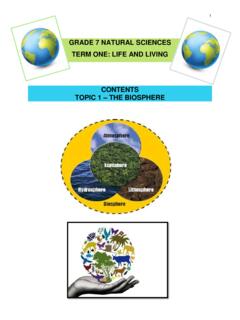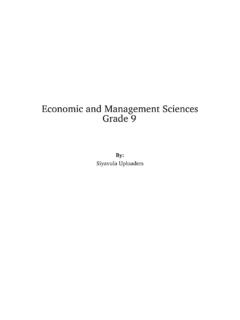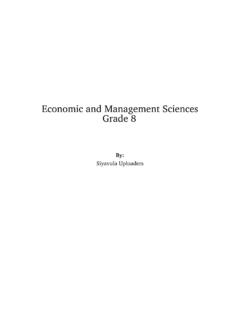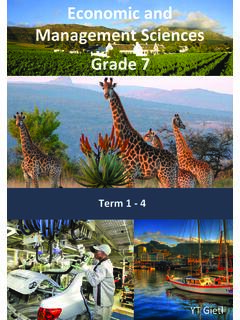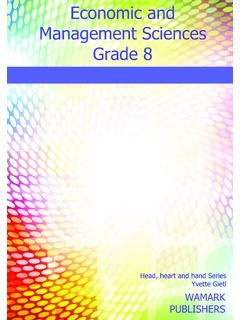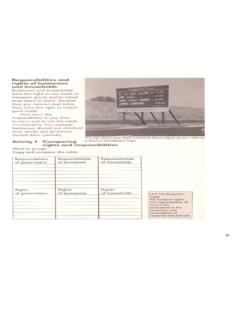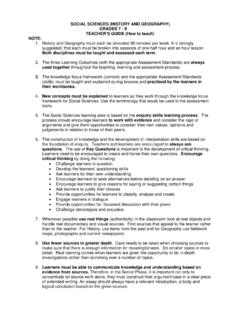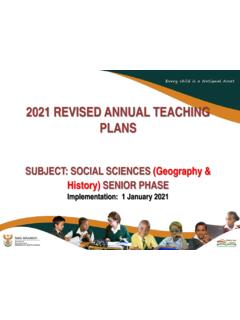Transcription of GRADE 7 ECONOMIC AND MANAGEMENT SCIENCES TERM 1
1 1 GM 2018 GRADE 7 ECONOMIC AND MANAGEMENT SCIENCES TERM 1 Contents TOPIC 1: THE ECONOMY - THE HISTORY OF MONEY .. 5 Lesson .. 5 Traditional societies .. 5 Modern Societies .. 6 Bartering .. 6 Activity .. 7 Disadvantages of bartering .. 7 Lesson .. 7 Early forms of money .. 7 History of coins and paper money .. 8 .. 8 Lesson .. 9 Promissory notes .. 9 Activity .. 10 Homework Task .. 10 Lesson .. 10 Advantages and disadvantages of using the Internet for banking and buying .. 10 Activity .. 11 Lesson .. 11 Activity .. 12 Lesson .. 12 Activity .. 13 Activity .. 13 2 GM 2018 TOPIC 2: NEEDS AND WANTS .. 13 Lesson .. 13 An individual s basic needs .. 14 Basic needs of communities and countries.
2 14 Activity .. 14 Lesson .. 15 Activity .. 16 Lesson .. 17 Activity .. 17 Lesson .. 18 Limited resources to satisfy needs and wants .. 18 Activity .. 20 Lesson .. 20 The ECONOMIC Problem .. 20 Activity .. 21 Lesson .. 21 Needs and wants that are satisfied by water .. 21 Activity .. 21 TOPIC 3: GOODS AND SERVICES .. 22 Lesson .. 22 The Primary Sector .. 22 The Secondary Sector .. 23 The Tertiary Sector .. 23 Activity .. 24 Lesson .. 25 Goods and services .. 25 Goods .. 25 Services .. 26 3 GM 2018 Activity .. 26 Lesson .. 27 Producers and consumers .. 27 The role of households as producers and consumers .. 27 Activity .. 28 Lesson .. 28 Using goods and services efficiently and effectively.
3 28 Activity .. 29 Lesson .. 29 How to recycle and re-use goods to satisfy needs and wants .. 29 Activity .. 31 Lesson .. 31 Activity .. 31 TOPIC 4: ENTREPRENEURSHIP - BUSINESSES .. 32 Lesson .. 32 Developing and Developed Countries .. 32 Formal and Informal Businesses .. 33 Activity .. 34 Lesson .. 34 Types of business that are both formal and informal .. 34 Activity .. 35 Lesson .. 36 Advantages and disadvantages of informal and formal businesses .. 36 Activity .. 37 Lesson .. 37 The role of formal and informal businesses as producers and consumers .. 37 Activity .. 38 Activity .. 38 4 GM 2018 Lesson .. 38 The effects of natural disasters and health epidemics on formal and informal businesses.
4 38 Activity .. 39 ASSESSMENT: TERM 1 Task 1: Assignment Task 2: Test on Term 1 content 5 GM 2018 TOPIC 1: THE ECONOMY - THE HISTORY OF MONEY In this topic we will learn more about the history of money, from traditional societies, who used bartering, to the use of promissory notes and coins and to paper money. We will also learn about modern systems of banking, such as electronic banking and the role of money in society. Lesson Traditional societies Over 100 000 years ago, people provided for their own needs. They were self-sufficient and lived on whatever was provided by nature. There was no trade and no money. Examples of people who lived self-sufficient lives were the hunter-gatherers in South Africa, the 'Twa' in Zaire, the Inuit in Alaska and the Aborigines in Australia.
5 They lived on meat from the wild animals and the food from plants. This is called hunting and gathering. They used everything they produced. People had to produce all the goods and services they needed. They had a limited range of goods and services available. The community used basic methods to hunt and harvest foods. They lacked technology, so most of their activities revolved around people producing all the things that they needed, to survive. This is called a SUBSISTENCE ECONOMY. 6 GM 2018 Modern Societies Most modern societies use coins, notes and debit or credit cards to pay for goods or services. They also use electronic banking, such as Internet banking.
6 A modern society is an Industrialised society that uses technology to produce goods for trade. People have specialised skills and have to rely on other people to produce goods and provide services that they cannot make or provide. Bartering While hunting and gathering means that people provided for their own needs, hunters were gradually able to tame and keep their animals. This led to herding. Herders moved from place to place to find food and water, animals and themselves. They kept cattle and goats and would rather live off the goats milk than kill them. Animals were only killed when there was not enough wild meat to eat. Herders moved in larger groups from place to place.
7 As groups met each other, they exchanged goods. As societies developed and started to travel, people started to specialise in the production of specific goods and foods. They realised that people in other areas had items they needed or wanted. A system of trade developed, whereby personal possessions of value could be exchanged for other goods. This kind of exchange dates back to 9000-6000 BC and is called bartering, and is still in use today. The first people didn t buy goods from other people with money. They bartered with each other. 7 GM 2018 Activity What do you think the advantages and disadvantages of bartering are? ADVANTAGES DISADVANTAGES 1. 1. 2. 2.
8 3. 3. 4. 4. 5. 5. Disadvantages of bartering 1. It was not always practical. 2. It was difficult to find what you wanted or needed. 3. Goods were difficult to carry or to transport. 4. There is no common measure of value. 5. Certain goods can t be divided into smaller units. 6. No late payments can be allowed. 7. Storing goods is difficult. 8. It was difficult to work out the real value of the items because people attached different values to different items. Lesson Early forms of money The first evidence of a type of money was cowry shells. They were used in 1200 BC in China. In 1000 BC, China produced imitation cowry shells - this can be thought of as the original development of coins.
9 In about 500 BC, pieces of silver were the earliest coins. These coins were first used in Lydia (Turkey). In 118 BC, leather banknotes were used in China. 8 GM 2018 History of coins and paper money 9000 BCE Barter with livestock and crops. 1200 BCE Cowry shells used as money in China. Most widely and longest used currency in history. 1000 BCE Money made from metals, such as copper. They often had holes in the centre, so they could be strung together, for safe-keeping. 700 BCE Coins made from precious metals such as silver, bronze and gold. Coins were valued according to size and weight. Later, coins were stamped with its value, so there was no need to weigh them.
10 800CE Paper currency appeared in China. 1950CE Credit cards were issued, and used in the USA. Today Internet banking, ATMs used. 9 GM 2018 Lesson Promissory notes This means a written and signed promise to pay a sum of money. Payer: Somebody who pays somebody. Payee: Somebody to whom money is paid or owed to. A promissory note must include: The term Promissory Note . The amount that the note is worth. Interest that will be added. When the payment has to be made. The place where payment is to be made. Name of the Payee. Payer s signature. terms of repayment. Date until when the promissory note is valid. Visit: to download examples of promissory notes. 10 GM 2018 Activity 1.
